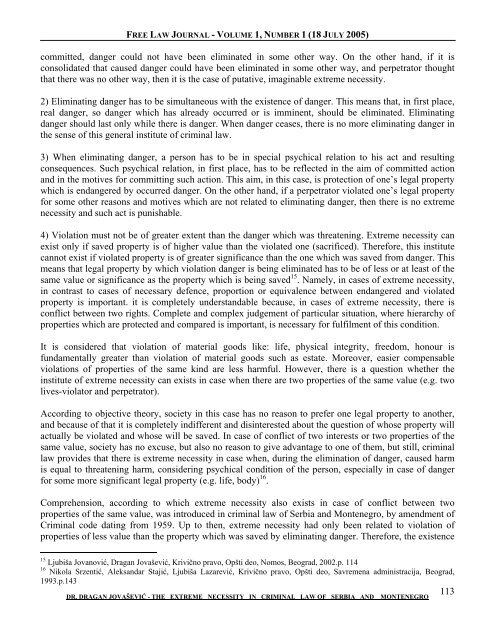Free_Law_Journal-Vol.. - Free World Publishing Inc.
Free_Law_Journal-Vol.. - Free World Publishing Inc.
Free_Law_Journal-Vol.. - Free World Publishing Inc.
You also want an ePaper? Increase the reach of your titles
YUMPU automatically turns print PDFs into web optimized ePapers that Google loves.
FREE LAW JOURNAL - VOLUME 1, NUMBER 1 (18 JULY 2005)<br />
committed, danger could not have been eliminated in some other way. On the other hand, if it is<br />
consolidated that caused danger could have been eliminated in some other way, and perpetrator thought<br />
that there was no other way, then it is the case of putative, imaginable extreme necessity.<br />
2) Eliminating danger has to be simultaneous with the existence of danger. This means that, in first place,<br />
real danger, so danger which has already occurred or is imminent, should be eliminated. Eliminating<br />
danger should last only while there is danger. When danger ceases, there is no more eliminating danger in<br />
the sense of this general institute of criminal law.<br />
3) When eliminating danger, a person has to be in special psychical relation to his act and resulting<br />
consequences. Such psychical relation, in first place, has to be reflected in the aim of committed action<br />
and in the motives for committing such action. This aim, in this case, is protection of one’s legal property<br />
which is endangered by occurred danger. On the other hand, if a perpetrator violated one’s legal property<br />
for some other reasons and motives which are not related to eliminating danger, then there is no extreme<br />
necessity and such act is punishable.<br />
4) Violation must not be of greater extent than the danger which was threatening. Extreme necessity can<br />
exist only if saved property is of higher value than the violated one (sacrificed). Therefore, this institute<br />
cannot exist if violated property is of greater significance than the one which was saved from danger. This<br />
means that legal property by which violation danger is being eliminated has to be of less or at least of the<br />
same value or significance as the property which is being saved 15 . Namely, in cases of extreme necessity,<br />
in contrast to cases of necessary defence, proportion or equivalence between endangered and violated<br />
property is important. it is completely understandable because, in cases of extreme necessity, there is<br />
conflict between two rights. Complete and complex judgement of particular situation, where hierarchy of<br />
properties which are protected and compared is important, is necessary for fulfilment of this condition.<br />
It is considered that violation of material goods like: life, physical integrity, freedom, honour is<br />
fundamentally greater than violation of material goods such as estate. Moreover, easier compensable<br />
violations of properties of the same kind are less harmful. However, there is a question whether the<br />
institute of extreme necessity can exists in case when there are two properties of the same value (e.g. two<br />
lives-violator and perpetrator).<br />
According to objective theory, society in this case has no reason to prefer one legal property to another,<br />
and because of that it is completely indifferent and disinterested about the question of whose property will<br />
actually be violated and whose will be saved. In case of conflict of two interests or two properties of the<br />
same value, society has no excuse, but also no reason to give advantage to one of them, but still, criminal<br />
law provides that there is extreme necessity in case when, during the elimination of danger, caused harm<br />
is equal to threatening harm, considering psychical condition of the person, especially in case of danger<br />
for some more significant legal property (e.g. life, body) 16 .<br />
Comprehension, according to which extreme necessity also exists in case of conflict between two<br />
properties of the same value, was introduced in criminal law of Serbia and Montenegro, by amendment of<br />
Criminal code dating from 1959. Up to then, extreme necessity had only been related to violation of<br />
properties of less value than the property which was saved by eliminating danger. Therefore, the existence<br />
15 Ljubiša Jovanović, Dragan Jovašević, Krivično pravo, Opšti deo, Nomos, Beograd, 2002.p. 114<br />
16 Nikola Srzentić, Aleksandar Stajić, Ljubiša Lazarević, Krivično pravo, Opšti deo, Savremena administracija, Beograd,<br />
1993.p.143<br />
113<br />
DR. DRAGAN JOVAŠEVIĆ - THE EXTREME NECESSITY IN CRIMINAL LAW OF SERBIA AND<br />
MONTENEGRO
















